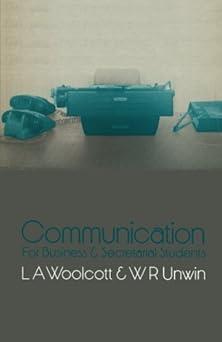30 p.m. The main restriction, apart from presence during the core time, is that over a given...
Question:
30 p.m. The main restriction, apart from presence during the core time, is that over a given settlement period, which can be a week or a fortnight, but more usually a month, employees have to work the total number of hours for which they have contracted, i.e. if the contracted time is seven hours per day, they have to be present in total for 140 in a month of 20 working days. There are refinements. Many companies have added an additional flexible band to cover the lunch break. Employees can now take up to 1 Y2 hours, but they must observe a minimum of half-an-hour. Most companies which have implemented this system allow a further concession; the possibility of a debit or credit carry forward of up to ten hours. Debit/ credit hours should be made up, or taken, during the flexible bands of the following settlement period; but some companies allow a half day per month off in core time against accumulated credit hours.
It is not all' blue skies', however. But nor has the old adage that if you give a man enough rope he will hang himself proved true, either. At Messerschmitt-
Bolkow-Blohm, for example, employees are almost always in credit to the tune of, on average, approximately four hours per employee. There are other advantages to the company, according to a survey carried out by the German Personnel Management Association. Out of a total of thirty companies replying, improvement in working atmosphere was reported by 24; reduction of paid absence by 25; reduction of overtime worked by 15; increased productivity by individuals adjusting hours worked to their own best work rhythm by 17; improved recruitment success by 19; and reduced personnel turnover by 6.
A!anag~ntToday,January1913
(a) Summarise in not more than 100 words how the flexible work hours system works.
(b) Give the meaning of the following expressions, as they are used in the passage:
straitjacket conurbation commuting settlement period 'blue skies'.
(c) What advantages does the system have (i) for employers?
(ii) for employees?
(d) What disadvantages can you foresee?
6. Read the following passage carefully and then answer the questions below.
What is most precious in Dostoievsky? First, his childlike single-minded clarity as a viewer oflife, and his fusion of this with an adult complex view, a singular union of opposites. Incidentally this is probably a Christian view, although of course one does not have to be a Christian in order to appreciate its force. And we also find in this writer the union of opposites in a more general way, a vision of the possibility of virtue in many different places, including unexpected places; and the existence of evil in unexpected places, too. This is George Bernard Shaw's view - that our best allies, and worst enemies, are ourselves: that each one of us is both light and dark, that we make fools of ourselves when we make wholesale criticisms of other nations, other groups. If one really believes this to be true, if one has given up seeing human society as black and white, then it means an end of witch-hunts against people of another kind. They are not of another kind, because they are our kind. To see this is to grow up, to become human.
And the last thing about Dostoievsky to discuss now - and here again one hopes he was prophetic - is his insistence, as a moral teacher, on the great positives. People today are searching for a new morality, a less unnatural ethic: the danger is that in despair of traditional morality they may well overthrow morality altogether. So often religion and ethics have become a series of very dreary negations, which might be caricatured by a list of this sort- don't drink, don't swear, don't smoke, don't gamble, don't run after the girls and (very particularly) don't enjoy yourselves too much. We all have our narrow-mindedness: we are entitled, perhaps, to feel in an individualised unaggressive way, that it is right for us to oppose certain things. But generally people, and young people especially, do not respond well, and are not made to respond well, to a series of prohibitions. There are times when a plain yea or nay is the only solution to a difficult human problem; but often life is too complex, too delicate, for our clumsy negations. How much better it is to take the great positives, to trust to love and let it sort life out. 'Let not men's sins trouble you in your work,' says Father Zossima. 'Love man even in his sin.' In these sermons, which act as a cornerstone of that extraordinary book, The Brothers KaramazO'V, we find an ethic of fellowship which comes near to a fusion between the puritan and the libertarian aspects of our natures: it includes a keen stress upon the principle of joy. This stress is at one with the healthy life of the world, with modern thinkers in a number of fields who have striven for a fusion between religious instincts and the common life of man- Joan Littlewood, Arnold Wesker, Dr Paul Tillich; and with the great artists, like Beethoven, who closed his last symphony with an ode to joy.
Roy Stevens, An Approach to Literature
(a) Explain briefly the meaning of the following expressions:
witch-hunts ethic caricatured puritan libertarian
(b) Explain briefly, in your own words, 'So often religion and ethics have become a series of very dreary negations'.
(c) What does the author find 'most precious in Dostoievsky'?
(d) Explain, in about 40 of your own words, what are the great positives upon which Dostoievsky insists.
Step by Step Answer:

Communication For Business And Secretarial Students
ISBN: 9780333261750
1st Edition
Authors: Lysbeth A Woolcott, Wendy R Unwin






